- Home
- Collins, Max Allan
Scratch Fever Page 2
Scratch Fever Read online
Page 2
Out in the other room, on stage, the trio was doing its big finish, which amounted to lots of sliding up and down on the bass neck for Les, some horrible high squealing lead up on the neck of the Gibson Explorer for Roc, and a frantic series of trips around the drum kit for Mick.
“Let me have a sip of that,” Jon said, nodding at her whiskey bottle.
“You never touch this shit,” Toni said, unscrewing the cap again.
“I know,” Jon said, taking the bottle, swigging it. “But Nolan does.”
Soon they were back on stage doing a song called “Die Young, Stay Pretty.”
2
IT WAS that kid, it was that goddamn kid!
Dammit!
What the hell was he doing here, playing in a rock band, for Christ’s sake? His curly hair was shorter, but otherwise he hadn’t changed; it was him, all right. Standing behind a portable organ, singing some unintelligible lyrics into a microphone, his voice booming out of the PA system.
The ironic thing was that it was this band—the Nodes—that had brought her here. She had heard the group was breaking up after this engagement, which meant they wouldn’t have anything booked for the following week, which meant hopefully she could convince them to stay together long enough to play Tuesday through Saturday at her club, the Paddlewheel. She’d had a cancellation and needed a band, and this group, the Nodes, while not precisely the sort of group she usually booked in, had a reputation in the Midwest. So she’d come to hear them, and to talk to the leader.
Whose name, it turned out, was Jon.
“Yeah,” Bob Hale said, as they sat at the bar on one side of the dance floor, yelling to be heard above the band, “it’s that kid on the end, playing the organ.”
She had looked at the kid, and he immediately seemed familiar to her.
“Nice enough kid,” Bob was saying. He was a big, florid man in his forties, with reddish-brown hair and a childlike manner that gave him a certain immature charm. “You wouldn’t know it to look at the squirt, but he’s strong. Judas Priest, you should see him carry those amplifiers around, like they was pillows. The girls seem to go for him.”
“Do they.”
“Sure do.” Bob grinned at her; he had big teeth. “Get you a drink, honey?”
“What did you say his name was?”
“Jon. I don’t know what his last name is.”
“Jon.”
“Yeah. They’re booked out of Des Moines. Or they were. Like I said, this is supposed to be their last night. But maybe I could talk to ’em for you and convince ’em that . . .”
She didn’t hear anything else Bob said after that; she was walking away. Before that kid on stage got a good look at her.
Not that it mattered, at this point; she’d seen the flash of recognition—or something—on his face. He shouldn’t have been able to recognize her, not at that distance; not with the blonde-streaked hair, the glasses, the business-like suit and sweater she’d worn. But the feeling in her stomach said he had recognized her. Goddammit. Goddammit!
Now she was out in the bar that connected the restaurant and club, which, like the rest of the Barn, was rustic—lots of rough barnwood decorated with an occasional horse-collar mirror and bogus wanted posters with Bob Hale’s name and face on them. There were booths with baskets of peanuts and popcorn on either side of the dimly lit room, enclosed on three sides and affording enough privacy for people to sit and neck if they liked. Several couples were doing that now, and there were a few people sitting up at the bar, but otherwise the action at the Barn was clearly in where the Nodes were playing, rather obnoxiously, she thought. Which made her smile, and the smile felt like cement cracking. If they play loud shit like that, she thought, I wouldn’t have hired them anyway.
She was sitting in a booth. The man she’d come with, Harold, looked over from the bar, where he was nursing a Scotch and water.
Harold was a big man, even though he stood only five-eight. He had the shoulders and thick arms, big hands, of a football player specifically a guard, which was the position he’d played in high school and college, before he dropped out. His face, however, was surprisingly sensitive: heavy-lidded gray eyes behind black-rimmed glasses; a bulbous, flat-bridged nose that had never been broken; a full-lipped, sensual mouth, kept wet by nervous licking.
He came over to her. He was wearing a tan suit with a dark tie; his hair, a sandy brown, was thinning on top and cut short on the sides. He looked like a high school football coach who quit to sell insurance; but what he was was her business partner, co-manager of the Paddlewheel, their club in Gulf Port.
“What’s wrong?” Harold said. He had a soft, hoarse voice.
“Sit down,” she said.
Harold had left his Scotch and water behind; he sat across from her, hands folded. He licked his lips. He had that look she hated: the look as if he were about to cry.
“I should’ve gone to fucking Brazil,” she said. She was sitting shelling peanuts but not eating them.
“I see.”
“Give me one good reason why I should ever have gone back to you.”
“Okay. I love you.”
“Shut up.”
“What’s wrong?”
“Nothing. Nothing I can’t handle.”
“I see.”
“Do you?”
“I think so.”
“Tell me, then.”
“You saw somebody. Somebody who knew you, before.”
“How could you know that?” She never failed to be surprised by the big jerk’s perceptiveness.
“It was bound to happen,” he said with a shrug, hands still folded, “sooner or later. We’re not that far from where you lived before.”
She tore the shell off a peanut, rubbed the skin off the nut within. Added it to the little pile she was making.
“You should leave,” he was saying. “Have you spoken to this person?”
“No.”
“Then you should leave. Leave while he or she still is wondering whether it was you or not It’s that simple.”
She threw a shell at him. “It’s not that simple. God, you make me sick sometimes.”
“Who is it? Who recognized you?”
“A kid in the band.”
“A kid in the band?”
“A kid in the band. Remember the guy Logan I told you about?”
Logan was the name she knew Nolan by.
“Of course I remember.”
That kid in there, the organ player, that’s Jon.”
“Logan’s partner.”
“That’s right.”
“Who was in on the Port City thing.”
“Right.”
“I see.”
“Quit saying that!”
“All right. What do you want me to do?”
“Go in there and see which kid I mean. Go in and get a look at him. He’s the short kid with curly hair and a good build.”
“Okay.”
“Then come back and sit in this booth and watch the door.” The double doors between the bar and dance area were just a few feet away. “If he comes out and tries to use that pay phone during the band’s break, stop him.”
“How?”
“Just do it. But don’t come on like a strongarm. Say you’re expecting a call or something.”
“All right. Then what?”
“Then nothing. Just keep an eye on him, when he isn’t on stage. The band only has one more break. They’re playing their third set now, which means they have one more set to play.”
“After that, what happens?”
“We’ll deal with that when the time comes.”
“How?”
“However we have to.”
He reached for the ashtray and with one thick hand brushed the pile of peanuts and shells she’d been making into it. Then he reached out and touched her hand. Held it.
“I don’t kill people, Julie,” he said softly. Eyes and lips wet.
“I know you don’t.”
; “I’ll do anything for you but that”
“I know you will.”
“Anything.”
“I know.”
“But if it comes to . . . if it comes to that, I don’t even want to know about it.”
She smiled at him sweetly, squeezed his hand, thinking, Fucking hypocrite! You don’t care if somebody else does the killing, though, do you? Just so you don’t have to do it; just so you don’t have to know about it.
She let go of his hand. “Give me some change. I have a long-distance call to make.”
He half-stood in the booth, dug for some change, and gave it to her.
“Who are you calling?”
She got out of the booth. “You just stay put.”
He licked his lips and nodded, then reached for the basket of peanuts.
She went over to the pay phone and dialed a number in Illinois direct.
It rang six times, then a slurry baritone voice came on, saying, “Yeah, what?”
“Ron?”
“Yeah.”
“This is Julie.”
“I know it is.”
“I need you.”
“Do you?”
“I have a problem.”
“No kidding.”
“I’m serious, Ron.”
“So you’re serious. I ain’t heard from you in three weeks, and you’re serious.”
“I’m sorry. I really am.”
“Why should I be surprised you’re in trouble? You only come to me when you’re in trouble.”
“That isn’t so.”
“You only come to me when there’s some shit job that old numb-nuts Harold won’t do for you.”
“Ron, you have to come here right away.”
“Where’s ‘here’?”
“The Barn. Outside of Burlington.”
“Yeah, I know the place. They got good rock ’n’ roll there sometimes. Isn’t this the Nodes’ last weekend? That’s a good band. Better than the shit you book in, anyway.”
“Ron. This is serious.”
“Yeah, okay. I can hear it in your voice, it’s serious. Do I need to bring anything?”
“I think so.”
“That serious, huh? It’ll cost you.”
“Money’s no problem.”
“Who’s talking about money?”
“Ron. I’ll make this worth it for you. I promise.”
“Yeah, okay. I’m on my way.”
The phone clicked dead.
She shivered and hung up.
She went back to the booth and sat across from Harold, who was eating peanuts, slowly, methodically.
“Ron’s coming,” she said.
“I see,” he said. He pushed the basket of peanuts aside.
“Well, I can’t depend on you, can I? If something ugly has to happen, Ron’ll be up to it.”
“How can you . . .”
“Because I have to,” she said, biting off the words. “I’m supposed to be dead, goddammit . . . I ended up with $750,000 because Logan and Jon thought I was dead. If that kid gets to his friend with the news that I’m alive, that S.O.B.’ll come looking for me, and his money.”
“I could handle him.”
She laughed. “You couldn’t handle Ron.”
“Don’t make fun of me, Julie.”
“Harold, I’m sorry. You just don’t know this guy Logan. He’s like something out of a Mafia movie. Really scary.”
“You’ve got money, Julie. Give him his share.”
“He wouldn’t be satisfied with just his share.”
“Why not?”
“He’s a killer. He tried to kill me, once, remember?”
That was a lie, of course; it had been the other way around, but Harold didn’t know that.
Harold was balling those thick hands into fists the size of softballs. “If he tries to hurt you, I’ll . . .”
“What? What will you do? You don’t kill people, remember?”
They could hear the muffled blare of the band in the other room: “Scratch fever . . . Cat scratch . . .”
“That would be different,” he said.
“Would it?”
“You know it would.”
“We’ll let Ron handle it.”
“But who’ll handle Ron?”
“I will.”
“Good luck.”
She could handle Ron, all right, but the price was high: letting those hands rove across her body; letting those lips do what they wanted to. Sharing a bed with Harold was bad enough. Getting in bed with Ron was flat-out disgusting.
And, deep down, she was afraid of Ron. She was afraid of few human beings on this earth, but Ron was one of them.
But then, so was the man she knew as Logan.
3
THE LAST SONG of the third set was “19th Nervous Breakdown,” an old Stones song that Jon sang, and that tonight he was really identifying with.
He came down off the stage covered with sweat—not from nervousness: he was always wringing wet by the end of a set—and headed for the stage-right cubby hole behind the fake storefront, where he and Toni had spoken earlier. He grabbed a towel from the stack the Nodes always brought along with them. He wiped his face with it, rubbed his hair. Took off his shirt and ran the towel over his chest and back and arms, then put on a clean shirt. He went through at least three a night, and his sportcoat was always sopping by the end of the first set, discarded midway through the second. He worked hard at rock ’n’ roll.
So did Toni, but she didn’t seem to sweat at all. She stood in the doorway of the little room, leaning against the jamb, perverted pixie smile on her face. “How you doin’?” she asked him.
“Okay.” Jon smiled back.
She came in and reached behind the amp and drum cases for her bottle of Cutty Sark. “Still got that old girlfriend on your mind?”
“Yeah.”
She unscrewed the cap, swigged at the bottle. “Really sure it was her, are you?”
“I don’t know. Maybe it wasn’t.”
Toni put the Cutty Sark away and took him by the arm. “Let’s go have a look around.”
Jon and Toni went out into the club and walked onto the dance floor. Les, Roc, and Mick were at a table, huddled together, making plans for the next incarnation of their band. The two factions of the Nodes didn’t even exchange glances.
Their sound man/roadie, a twenty-year-old ex-DJ named Tommy, approached Jon and Toni. He looked like a pudgy, slightly dense Paul McCartney; he wore jeans and a T-shirt with the band’s logo on it—the nodes—in Art Deco lettering.
“Good set,” Tommy told them, smiling and nodding, on his way to join the Les, Roc, Mick faction, of which he was a part. Since he got his paychecks from Jon, however, Tommy stayed civil where Jon and Toni were concerned.
From the back of the hall, where the stage was, to the other end was nearly the length of a football field, and Jon and Toni were stopped a dozen times as they walked along the edge of the dance floor, by the crowded tables. The Nodes had played the Barn three times before, and had a following here; word had gotten around that this was the band’s last night, and the fans were complaining.
A table of girls who had all gotten in on fake I.D.’s grabbed at Jon as he passed; arms, hands reached out for him, like Night of the Living Dead, only pretty.
“You can’t break up,” a little blonde in a red satin warm-up jacket and Clash T-shirt said. She had him by the arm.
A pudgy but cute brunette in a blue satin warm-up jacket and T-shirt that said “Wanna Party?” had him by the leg; she was saying something too, but Jon couldn’t make it out
Two guys dressed like urban cowboys (and looking ridiculous, Jon thought, probably a couple of high school teachers who ditched their wives for the night) were standing talking to Toni, saying much the same thing the girls were saying to Jon, but without the touching. Relations between men and women may have changed, Jon noted, but it was still the women who did the touching without permission.
Bob H
ale was still sitting on a stool over at the bar, stage right. Jon pulled away from the table of girls and went over to him, leaving Toni behind with her admirers in cowboy hats.
Bob extended a big, rough hand, which Jon shook.
“We’re gonna miss you boys,” Bob said. Considering the way Bob was always pursuing Toni, it was amazing he had included her as one of the “boys.” Then, with a conspiratorial wink, Bob leaned in and said, “No other band pulls in the pussy like you guys.” Bob was grinning like a junior high kid who’d just discovered Hustler magazine.
“I appreciate that, Bob,” Jon said, sitting on the stool next to him. “You know, the other guys in the band’ll still be together, under another name.”
“I don’t give a shit about those guys. They play too fuckin’ loud. It’s you and little Toni that go over. The pussies like you, and the guys go for her.”
That was nice to hear, and was true enough, but Roc, Mick, and Les had a following, too. But Jon went along with Bob, saying, “Well, Toni and I may have a new band ourselves in a while.”
“You just give me a call when you do, and you got a booking.”
“Thanks, I will. Say, Bob. Who was that good-looking blonde you were talking to?”
“You’ll have to narrow ’er down,” Bob said, grinning even wider; he was the kind of person who could make a caricature out of himself without trying. “I talked to half a dozen good-looking blondes tonight already.”
“This one is old enough to be in here legally.”
“Yeah, but is she old enough for me to be in her legally?”
“She was about thirty, wearing a white jacket and dress, black sweater. Nice tits.”
“Oh, yeah, her. She’ll never drown.”
“Right, well, I didn’t get a good look at her from the stage. Aw, but you know how it is, Bob. Sometimes the closer you get . . .”
“The worse they look! Damn if that ain’t the truth.”
“How does this one look, close up?”
“Well she ain’t a ten.”
“No?”
“She’s a thirteen.”
“No kidding. Who is she? Do you know her?”
“Yeah, I know her. Wish I could say I could fix you up with her, but I never been able to get anywhere with her myself, believe it or not. That’s a high-class cunt. She’s got money.”

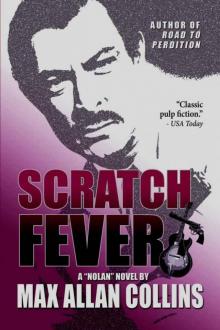 Scratch Fever
Scratch Fever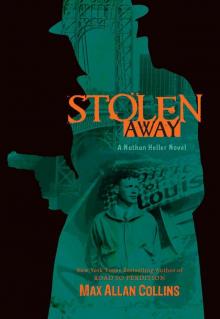 Stolen Away
Stolen Away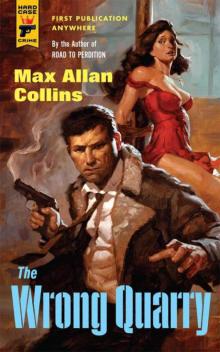 The Wrong Quarry (Hard Case Crime)
The Wrong Quarry (Hard Case Crime) Quarry
Quarry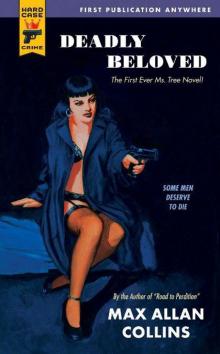 Hard Case Crime: Deadly Beloved
Hard Case Crime: Deadly Beloved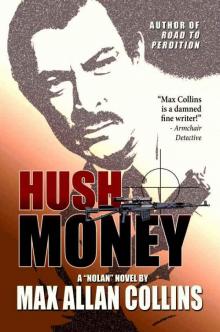 Hush Money
Hush Money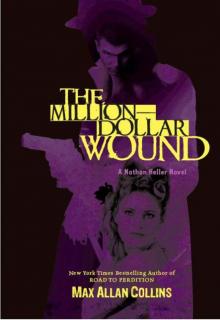 The Million-Dollar Wound
The Million-Dollar Wound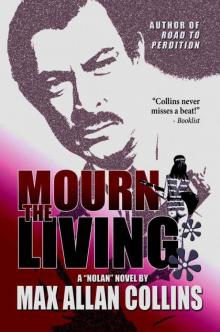 Mourn The Living
Mourn The Living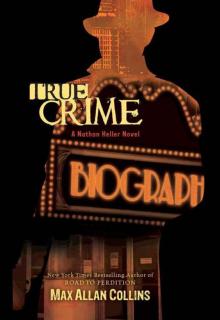 True Crime
True Crime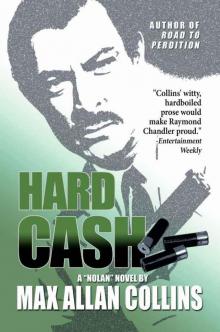 Hard Cash
Hard Cash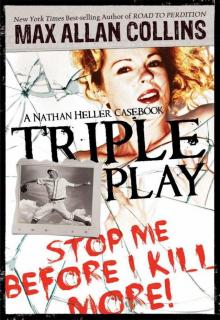 Triple Play: A Nathan Heller Casebook
Triple Play: A Nathan Heller Casebook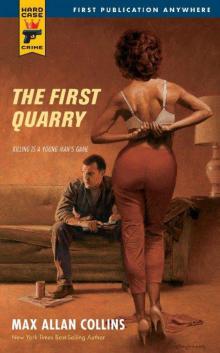 Hard Case Crime: The First Quarry
Hard Case Crime: The First Quarry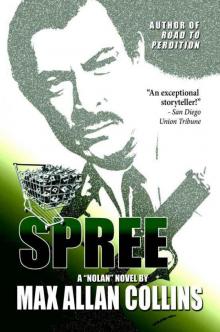 Spree
Spree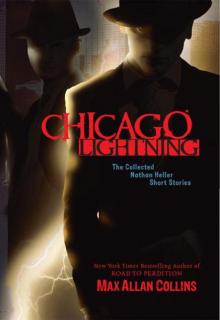 Chicago Lightning : The Collected Nathan Heller Short Stories
Chicago Lightning : The Collected Nathan Heller Short Stories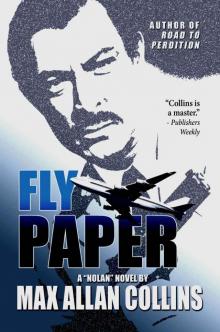 Fly Paper
Fly Paper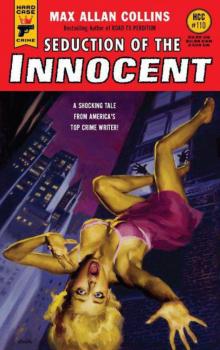 Seduction of the Innocent (Hard Case Crime)
Seduction of the Innocent (Hard Case Crime)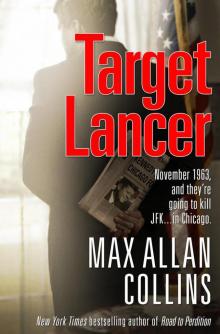 Target Lancer
Target Lancer